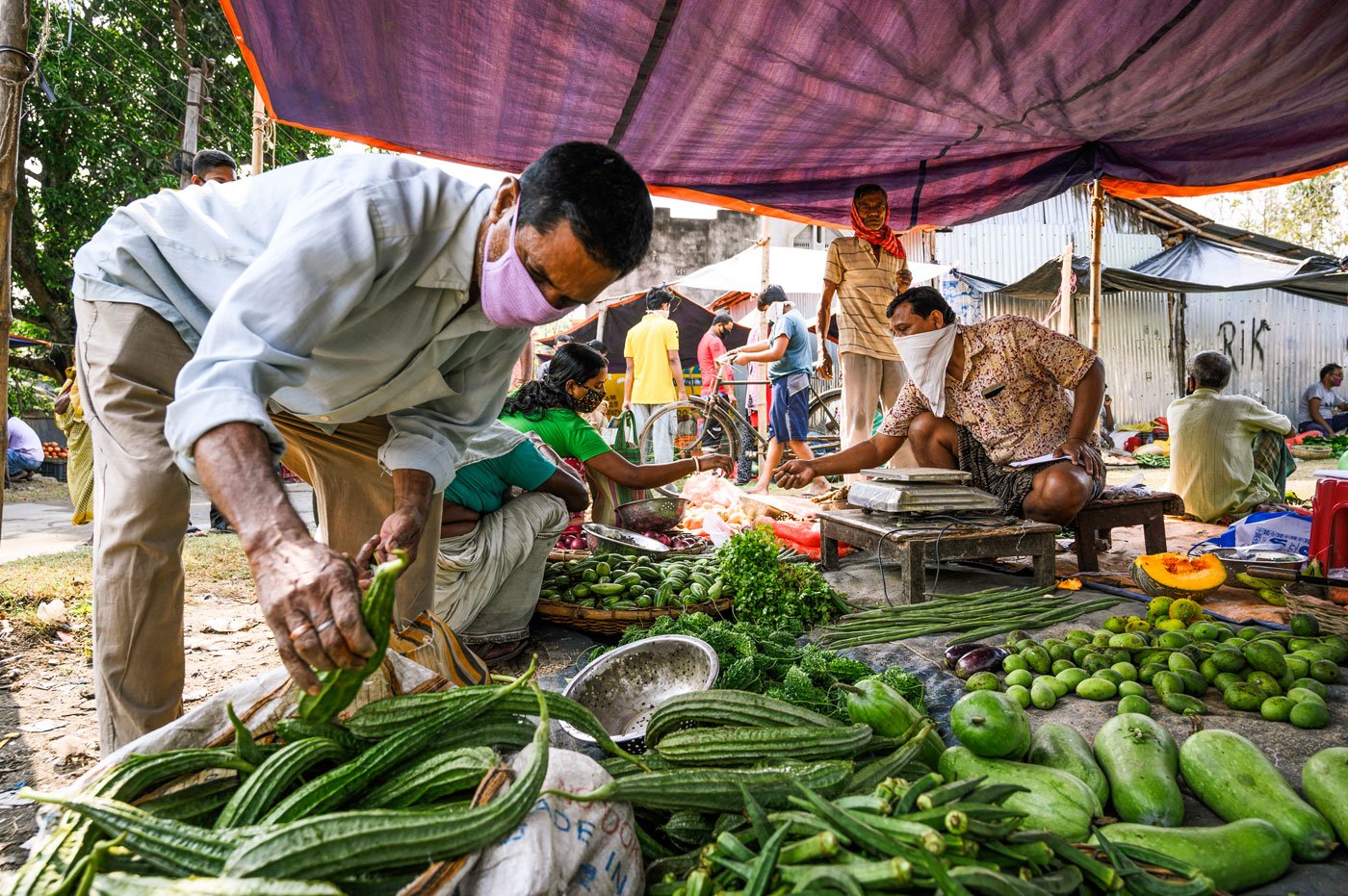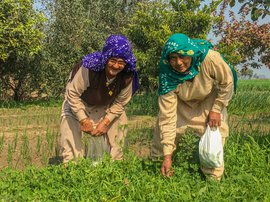ಕೋವಿಡ್ -19 ಲಾಕ್ಡೌನ್ನಿಂದಾಗಿ ತೆಹಟ್ಟಾ ಗ್ರಾಮದ ಚಟರ್ ಪಾರಾದಲ್ಲಿ ನಿಯಮಿತ ತರಕಾರಿ ಮಾರುಕಟ್ಟೆ ಮುಚ್ಚಿದೆ. ಆದ್ದರಿಂದ,ಈಗ ಪಶ್ಚಿಮ ಬಂಗಾಳದ ನಾಡಿಯಾ ಜಿಲ್ಲೆಯ ಈ ಗ್ರಾಮದ ದತ್ತಾ ಪ್ಯಾರಾ ಪ್ರದೇಶದ ಬಯಲು ಮೈದಾನವೊಂದರಲ್ಲಿ ಈಗ ತಾತ್ಕಾಲಿಕ ಮಾರುಕಟ್ಟೆಯೊಂದು ತಲೆ ಎತ್ತಿದೆ, ಈ ಮಾರುಕಟ್ಟೆ ಬೆಳಿಗ್ಗೆ 6ರಿಂದ 10ರವರೆಗೆ ತೆರೆದಿರುತ್ತದೆ.ತೆಹಟ್ಟಾ ಬ್ಲಾಕ್ I ನಲ್ಲಿರುವ ಈ ಗ್ರಾಮವನ್ನು ಪಶ್ಚಿಮ ಬಂಗಾಳ ಸರ್ಕಾರವು ಏಪ್ರಿಲ್ನಲ್ಲಿ 'ಹಾಟ್ಸ್ಪಾಟ್' ಎಂದು ಘೋಷಿಸಿದೆ.
ಮಾರುಕಟ್ಟೆ ದಿನದ ಚಿತ್ರಗಳು:
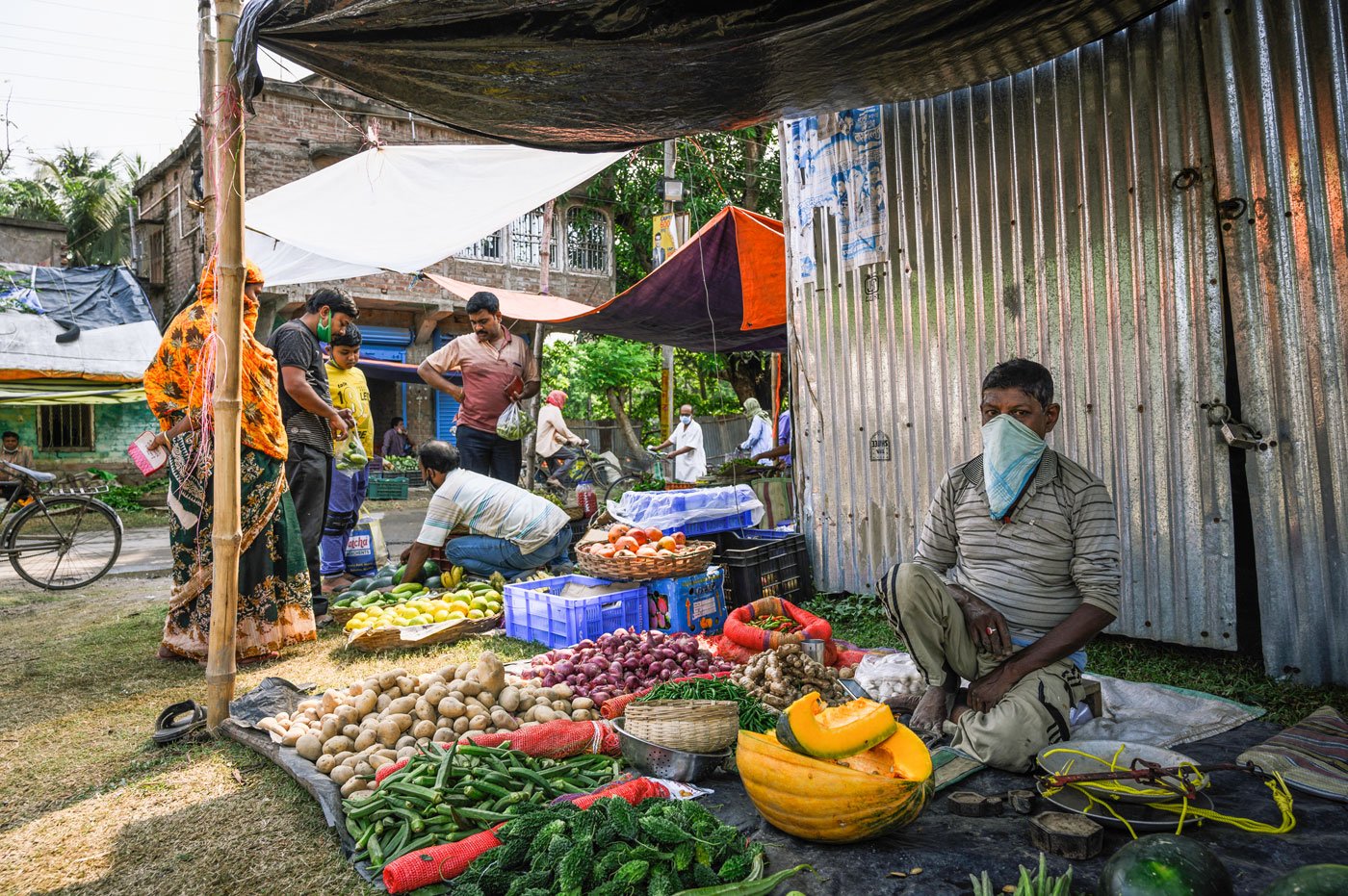
48 ವರ್ಷದ ಪ್ರೊಸಾಂತೋ ಮೊಂಡಾಲ್, ಬೆಳಿಗ್ಗೆ ದಾಲ್-ಪುರಿಯನ್ನು ಮತ್ತು ಸಂಜೆ ಆಲೂಗೆಡ್ಡೆ ಬೋಂಡಾಗಳನ್ನು ಮಾರಾಟ ಮಾಡುತ್ತಿದ್ದರು. ಆದರೆ ಈಗ ಲಾಕ್ ಡೌನ್ನಿಂದಾಗಿ ಬೀದಿ ಬದಿ ಆಹಾರವನ್ನು ಮಾರಾಟ ಮಾಡಲು ನಿಷೇಧ ಇರುವುದರಿಂದಾಗಿ ಅವರು ತರಕಾರಿಗಳನ್ನು ಮಾರಾಟ ಮಾಡಲು ಆರಂಭಿಸಿದ್ದಾರೆ. ಈ ಮೊದಲು ಅವರ ದೈನಂದಿನ ಗಳಿಕೆ ಸುಮಾರು 400 ರೂ.ಗಳಾಗಿರುತಿತ್ತು, ಆದರೆ ಈಗ ಕೇವಲ 150 ರೂ.ಮಾತ್ರ.ಈಗ ಅವರು "ತರಕಾರಿ ವ್ಯಾಪಾರದ ಬಗ್ಗೆ ನನಗೆ ಹೆಚ್ಚು ತಿಳಿದಿಲ್ಲ" ಎಂದು ಹೇಳುತ್ತಾರೆ.
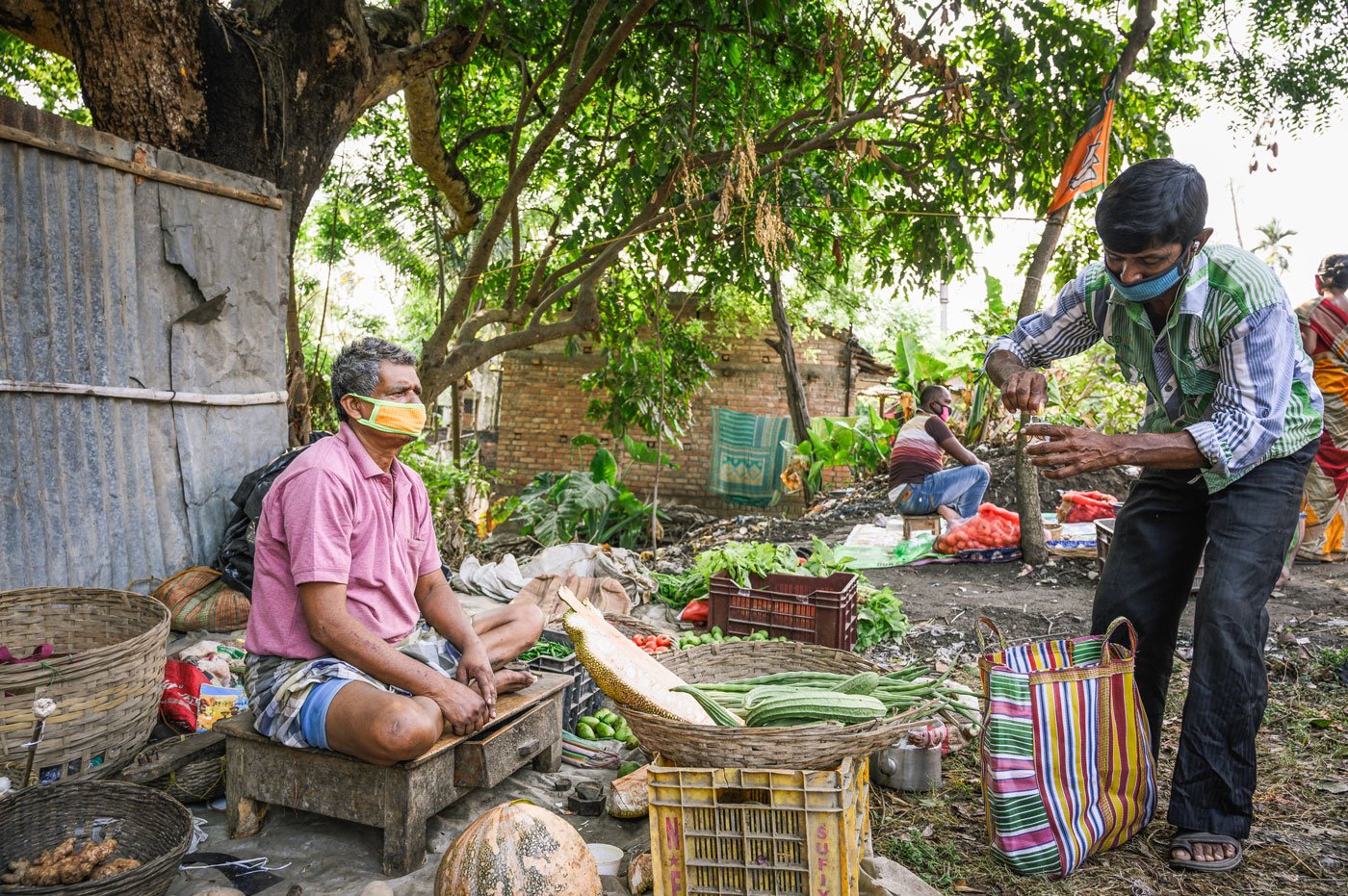
56 ವರ್ಷದ ತರಕಾರಿ ವ್ಯಾಪಾರಿ ರಾಮ್ ದತ್ತಾ,ಸಾಂತಿ ಹಾಲ್ಡರ್ ಅವರಿಂದ ಲೆಮನ್ ಟೀ ಖರೀದಿಸುತ್ತಾರೆ.ಈಗ ಅವರ ಆದಾಯವು ಈ ಮೊದಲು ಗಳಿಸುತ್ತಿದ್ದ ದೈನಂದಿನ 300 ರೂ ಗಳಲ್ಲಿ ಅರ್ಧದಷ್ಟು ಕುಸಿದಿದೆ."ಇದಕ್ಕೂ ಮೊದಲು ಅಂತಹ ಮಾರಾಟವೇನೂ ಆಗುತ್ತಿರಲಿಲ್ಲ, ಆದರೆ ಈಗ ಅದು ಇನ್ನಷ್ಟು ಹದಗೆಟ್ಟಿದೆ" ಎಂದು ಅವರು ಹೇಳುತ್ತಾರೆ. 48 ವರ್ಷದ ಸಾಂತಿ ಹಾಲ್ಡರ್ ಕಳೆದ 20 ವರ್ಷಗಳಿಂದ ಝಾಲ್ ಮುರಿ (ಪಶ್ಚಿಮ ಬಂಗಾಳದ ಜನಪ್ರಿಯ ಬೀದಿ ಆಹಾರ) ಮಾರಾಟ ಮಾಡುತ್ತಿದ್ದಾರೆ, ಆದರೆ ಈಗ ಲಾಕ್ ಡೌನ್ ನಿಂದಾಗಿ ಬೀದಿ ಬದಿ ಮಾರಾಟ ಮಾಡುತ್ತಿದ್ದ ಆಹಾರದ ಮೇಲೆ ನಿರ್ಬಂಧ ಹೇರಿರುವುದರಿಂದಾಗಿ, ಈಗ ಟೀ ಮಾರುತ್ತಿದ್ದಾರೆ. ಅವರ ಆದಾಯವು ಕೂಡ ದಿನಕ್ಕೆ ಗಳಿಸುತ್ತಿದ್ದ 250-300 ರೂ.ಗಳಿಂದ 100-120 ರೂ.ಗಳಿಗೆ ಕುಸಿದಿದೆ.
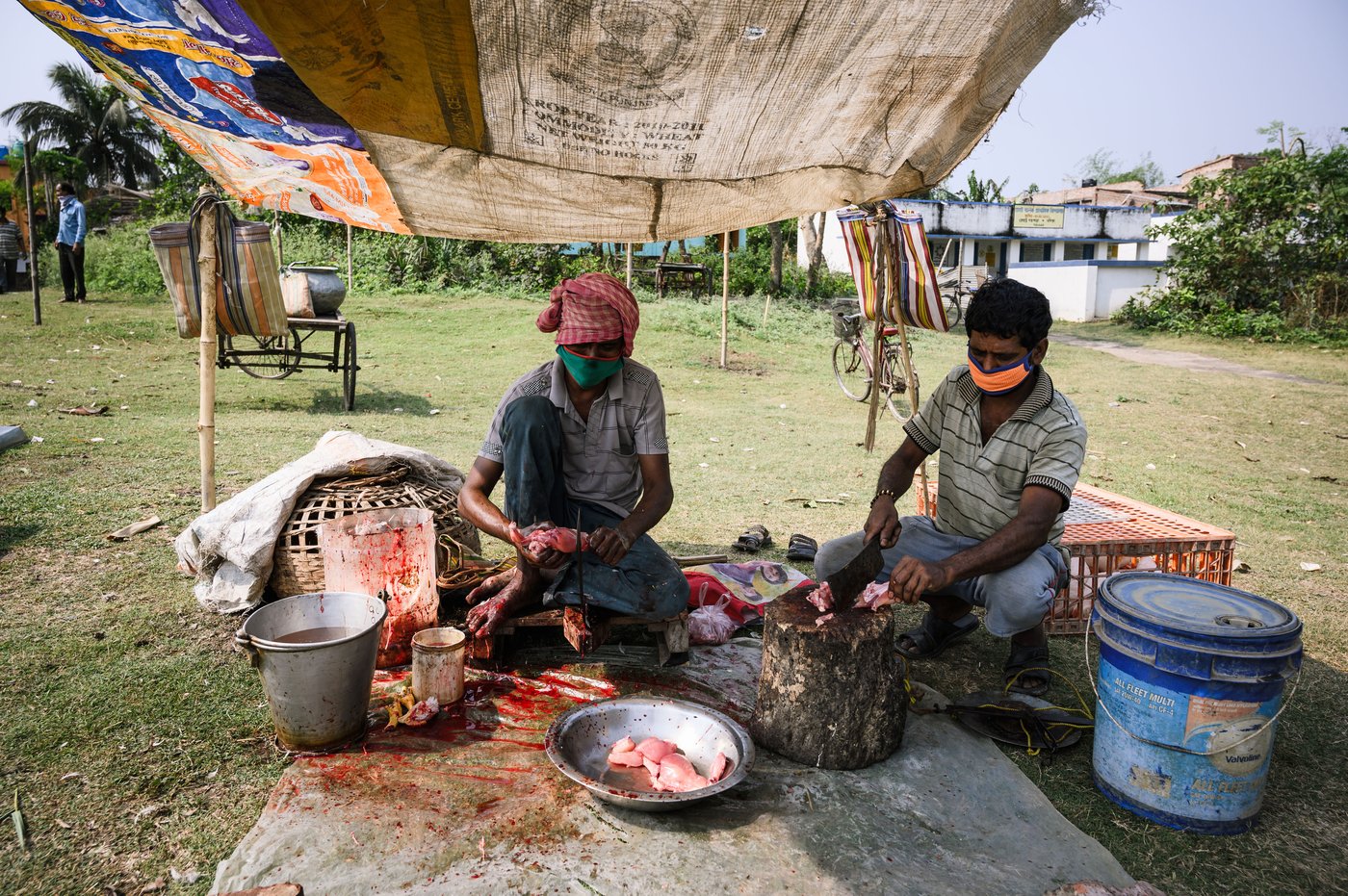
ಸುಖೇನ್ (ಎಡಕ್ಕೆ) ಮತ್ತು ಪ್ರೊಸನ್ಜಿತ್ ಹಾಲ್ದರ್ (ಬಲಕ್ಕೆ) ಇಬ್ಬರೂ ಸಹೋದರರು. ಸುಖೇನ್ ರೆಸ್ಟೋರೆಂಟ್ ವೊಂದರಲ್ಲಿ ಅಡುಗೆ ಮಾಡುತ್ತಿದ್ದರು, ಅದರಿಂದ ಅವರು ತಿಂಗಳಿಗೆ 10,000 ರೂ.ಗಳನ್ನು ಸಂಪಾದಿಸುತ್ತಿದ್ದರು, ಆದರೆ ಈಗ ಅವರಿಗೆ ದಿನಕ್ಕೆ ಕೇವಲ 200 ರೂ. ಮಾತ್ರ ದೊರೆಯುತ್ತಿದೆ, ಅದೂ ಕೂಡ ಅನಿಶ್ಚಿತವಾಗಿದೆ. ಪ್ರೊಸೆನ್ಜಿತ್ ಮೀನು ಸಾಕಣೆ ಕೇಂದ್ರದಲ್ಲಿ ಮತ್ತು ಕಲ್ಲಿನ ಕ್ವಾರಿಯಲ್ಲಿ ಅರೆಕಾಲಿಕ ಸಹಾಯಕರಾಗಿ ಕೆಲಸ ಮಾಡುತ್ತಿದ್ದರು. ಅವರ ಗಳಿಕೆಯಂತೂ ಸಾಧಾರಣವಾಗಿದೆ, ಎರಡೂ ಮೂಲಗಳಿಂದ ದಿನಕ್ಕೆ ಸುಮಾರು 250 ರೂ.ಗಳ ಆದಾಯ ಬರುತ್ತಿತ್ತು, ಈ ಮೊದಲು ಅವರು ಮೀನಿನ ಸಾಕಾಣಿಕೆ ಕೇಂದ್ರದಿಂದ ಸ್ವಲ್ಪ ಮೀನುಗಳನ್ನು ಮನೆಗೆ ತೆಗೆದುಕೊಂಡು ಹೋಗುತ್ತಿದ್ದರು. ಆದರೆ ಈಗ ಲಾಕ್ಡೌನ್ ಸಮಯದಲ್ಲಿ ಅದೂ ಸ್ಥಗಿತಗೊಂಡಿದೆ.
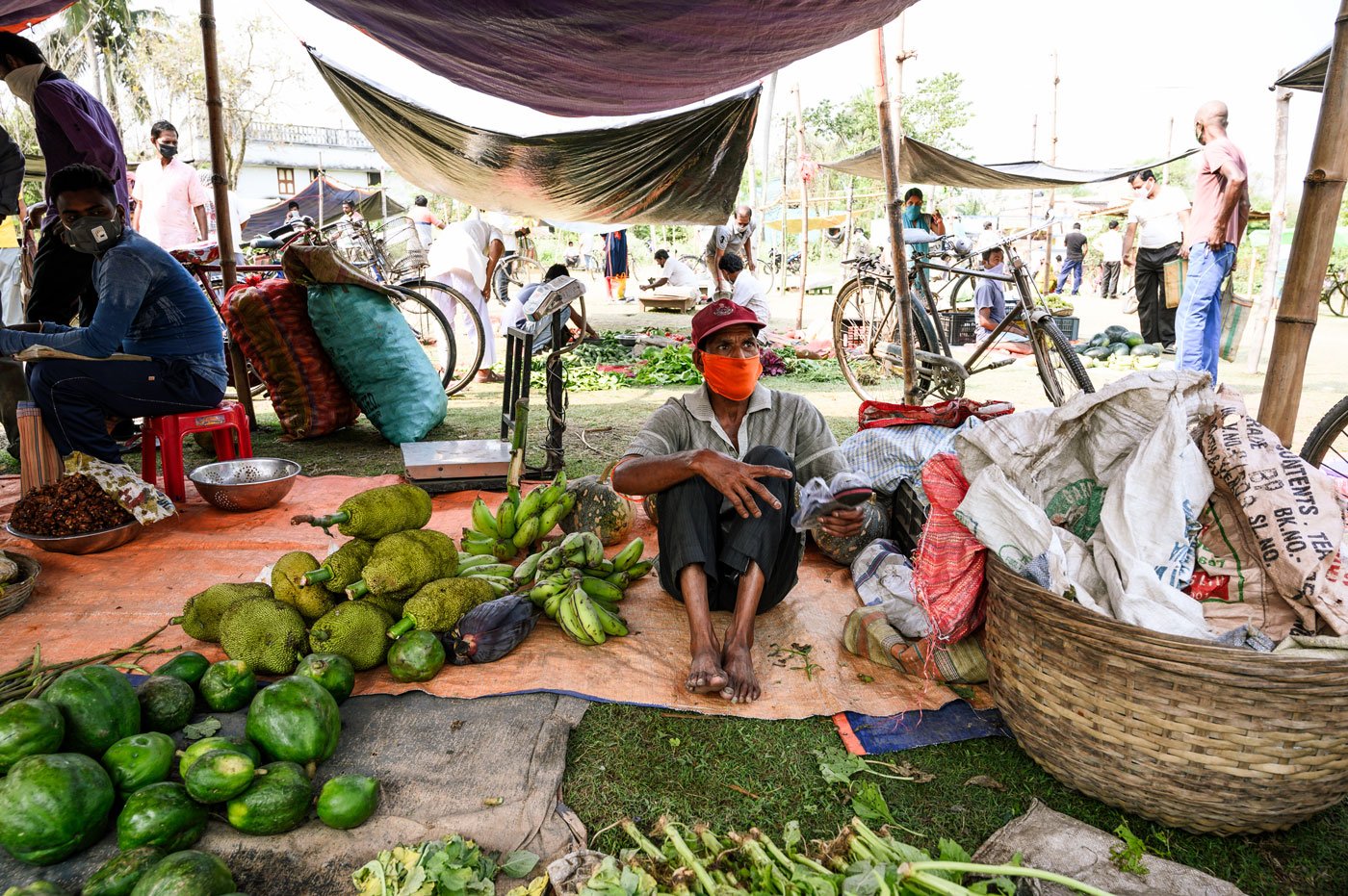
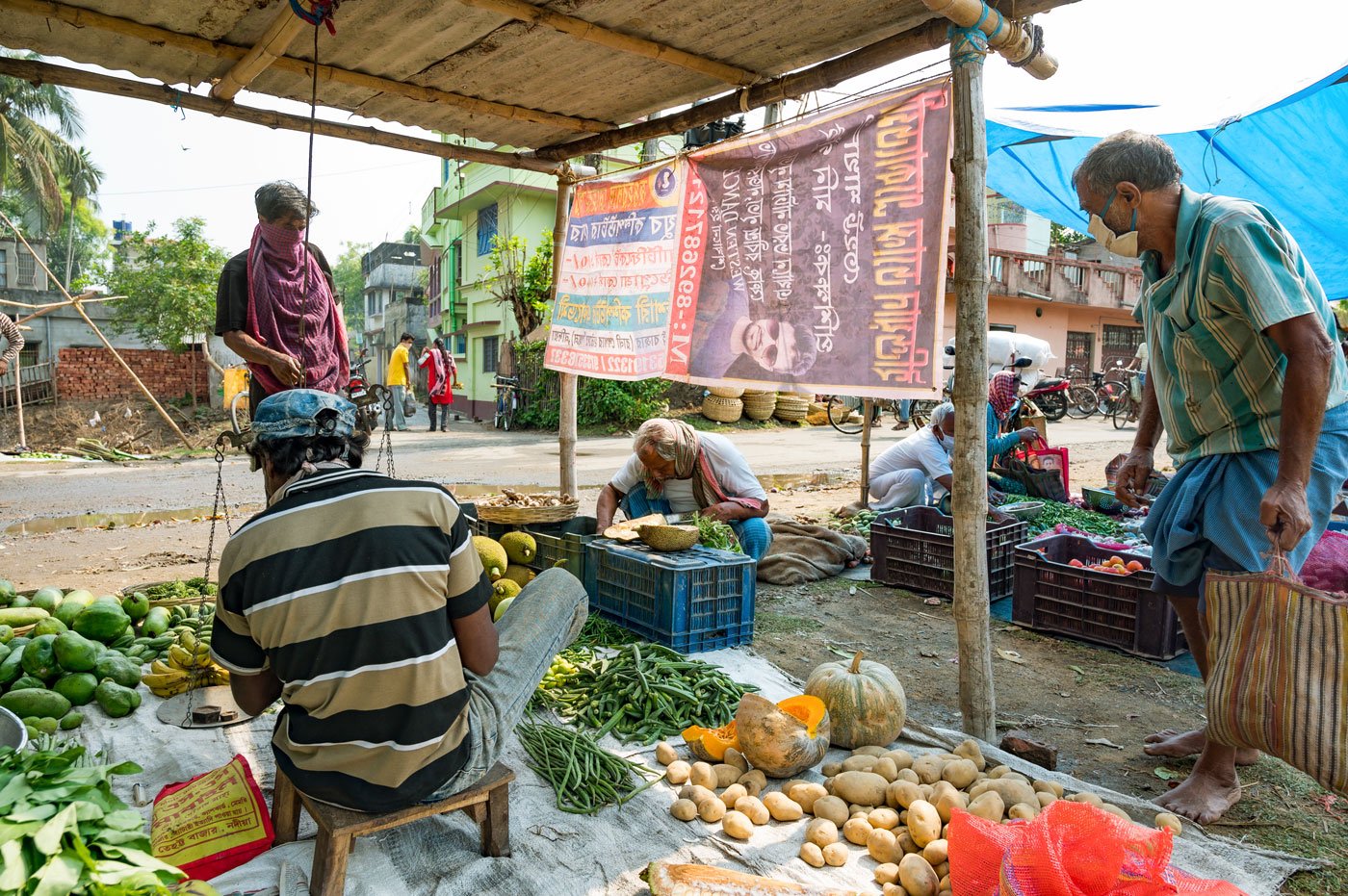
ಕಳೆದ 23 ವರ್ಷಗಳಿಂದ, 47 ವರ್ಷದ ಪ್ರಫುಲ್ಲಾ ದೇಬನಾಥ್ ಅವರು ಸಾಮಾನ್ಯ ಸಮಾಬೆ ಕೃಶಿ ಉನ್ನಯನ್ ಸಮಿತಿ ಮಾರ್ಕೆಟ್ ನಲ್ಲಿ ಸಣ್ಣ ಪುಟ್ಟ ಕೆಲಸಗಳನ್ನು ಮಾಡುತ್ತಿದ್ದಾರೆ (ಈಗ ಲಾಕ್ಡೌನ್ ನಿಂದಾಗಿ ಮುಚ್ಚಲಾಗಿದೆ). ಅವರು ಗ್ರಾಹಕರ ಮನೆಗಳಿಗೆ ತಲುಪಿಸಲು ಚೀಲಗಳನ್ನು ಒಯ್ಯುತ್ತಾರೆ ಮತ್ತು ವಾಹನಗಳಿಂದ ಅಂಗಡಿಗಳಿಗೆ ಸರಕುಗಳನ್ನು ಸಾಗಿಸುತ್ತಾರೆ. ಮತ್ತು ಅವರು ಇಡೀ ಮಾರುಕಟ್ಟೆಯಲ್ಲಿನ ಕಸ ಗೂಡಿಸುತ್ತಾರೆ. ಇದಕ್ಕಾಗಿ ಅವರು ಪ್ರತಿ ತರಕಾರಿ ವ್ಯಾಪಾರಿಗಳಿಂದ ದಿನಕ್ಕೆ 2 ರೂ. ಮತ್ತು ಇತರ ಅಂಗಡಿಯವರಿಂದ ದಿನಕ್ಕೆ 1 ರೂ. ಪಡೆಯುತ್ತಾರೆ. ಆದರೆ ಈಗ, ಮಾರುಕಟ್ಟೆಯು ದತ್ತಾ ಪಾರಾದಲ್ಲಿನ ಕ್ಷೇತ್ರಕ್ಕೆ ಸ್ಥಳಾಂತರಗೊಂಡಿದ್ದರಿಂದ, ಅವರ ಕೇವಲ ಗಳಿಕೆ ಈಗ ಅರ್ಧದಷ್ಟು ಕಡಿಮೆಯಾಗಿದೆ, ಆದರೂ ಕೆಲವು ತರಕಾರಿ ವ್ಯಾಪಾರಿಗಳು ದೇಬನಾಥ್ಗೆ ಉಪಾಹಾರ ಮತ್ತು ಊಟಕ್ಕೆ ವ್ಯವಸ್ಥೆ ಮಾಡುತ್ತಾರೆ.”ನಾನು ಸ್ವಚ್ಚಗೊಳಿಸದಿದ್ದರೆ, ಮಾರುಕಟ್ಟೆ ಕೊಳಕು ಆಗುತ್ತದೆ" ಎಂದು ಅವರು ಹೇಳುತ್ತಾರೆ. "ನಾನು ಮಾರುಕಟ್ಟೆಯನ್ನು ಸ್ವಚ್ಚಗೊಳಿಸಿದರೆ ಎಲ್ಲರಿಗೂ ನನ್ನ ಹೆಸರು ಗೊತ್ತಾಗುತ್ತದೆ. ನನ್ನಂತೆ ಯಾರೂ ಕೆಲಸ ಮಾಡುವುದಿಲ್ಲ! " ಎಂದು ಅವರು ಹೇಳುತ್ತಾರೆ. ‘ಬಲಕ್ಕೆ: ಮಾರುಕಟ್ಟೆ ಕೆಲವೇ ಗಂಟೆಗಳವರೆಗೆ ತೆರೆದಿರುವುದರಿಂದ, ಅನೇಕರು ಕಡಿಮೆ ಬೆಲೆಗೆ ಆಶಿಸುತ್ತಾ ಕೊನೆಯ ಗಳಿಗೆಯಲ್ಲಿ ಖರೀದಿಸುತ್ತಾರೆ. 50 ವರ್ಷದ ಖೋಕಾ ರಾಯ್ ವೃತ್ತಿಯಲ್ಲಿ ಮರಗೆಲಸದವರಾಗಿದ್ದು, ಇದರ ಜೊತೆಗೆ ಅವರು ಮನೆಯಿಂದ ಒಂದು ಸಣ್ಣ ಕಿರಾಣಿ ಅಂಗಡಿಯನ್ನು ನಡೆಸುತ್ತಿದ್ದರು ಮತ್ತು ಲಾಕ್ಡೌನ್ನಿಂದಾಗಿ ಈಗ ಅವರು ಮಾರುಕಟ್ಟೆಗೆ ಹೋಗಿ ಮಾರುತ್ತಿದ್ದಾರೆ. ದಿನಕ್ಕೆ 400-500 ರೂ.ಗಳವರೆಗಿನ ಅವರ ಆದಾಯ ಈಗ 200-250.ರೂ.ಗಳಿಗೆ ಕುಸಿದಿದೆ. "ಈಗ ಹೊರಗೆ ಪೊಲೀಸರು ಗಸ್ತು ತಿರುಗುವುದರಿಂದಾಗಿ, ಜನರು ತಮ್ಮ ಮನೆಗಳನ್ನು ಬಿಟ್ಟು ಹೊರಗೆ ಬರುವುದಿಲ್ಲ. ಈಗ ನೀವೇ ಹೇಳಿ ನಾವು ತರಕಾರಿಗಳನ್ನೂ ಹೇಗೆ ಮಾರಾಟ ಮಾಡಬೇಕು?" ಎಂದು ಅವರು ಪ್ರಶ್ನಿಸುತ್ತಾರೆ.
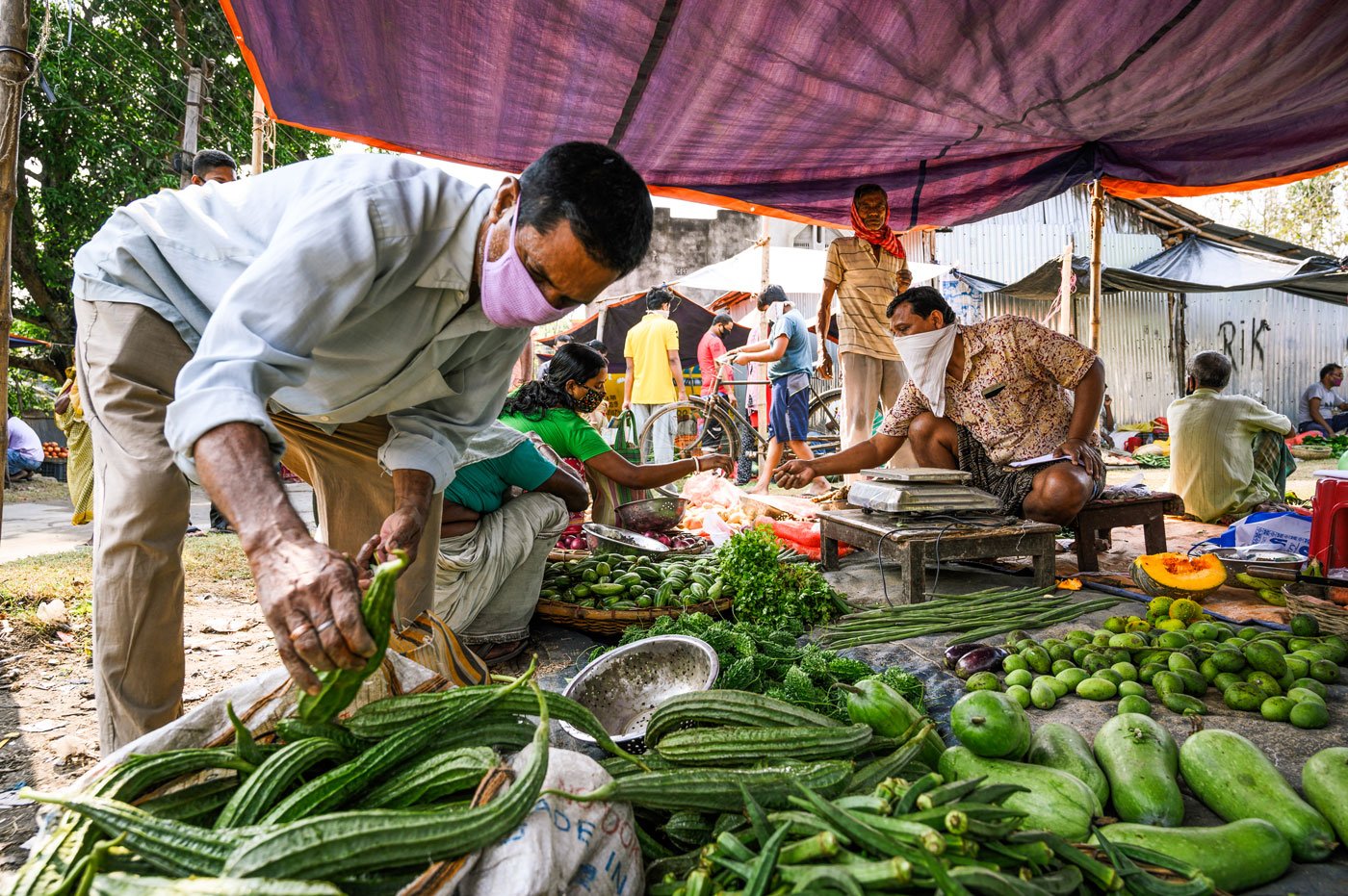
ಪರಿಮಲ್ ದಲಾಲ್ ಅವರ ಅಂಗಡಿಯಿಂದ ತರಕಾರಿ ತೆಗೆದುಕೊಳ್ಳುತ್ತಿರುವ ಗ್ರಾಹಕರು. ಕಳೆದ 30 ವರ್ಷಗಳಿಂದ ಈ ಕೆಲಸವನ್ನು ಮಾಡುತ್ತಿರುವ 51 ವರ್ಷದ ಪರಿಮಲ್ ಇತರರಿಗಿಂತ ಹೆಚ್ಚು ವಿಶ್ವಾಸದಿಂದಿದ್ದಾರೆ ಮತ್ತು "ನನ್ನ ವ್ಯಾಪಾರದಲ್ಲಿ ಅಷ್ಟೇನೂ ಬದಲಾಗಿಲ್ಲ. ನನಗೆ ಪರಿಚಯವಿರುವ ಗ್ರಾಹಕರು ಸಹ ಇಲ್ಲಿಗೆ ಬರುತ್ತಿದ್ದಾರೆ" ಎಂದು ಹೇಳುತ್ತಾರೆ.
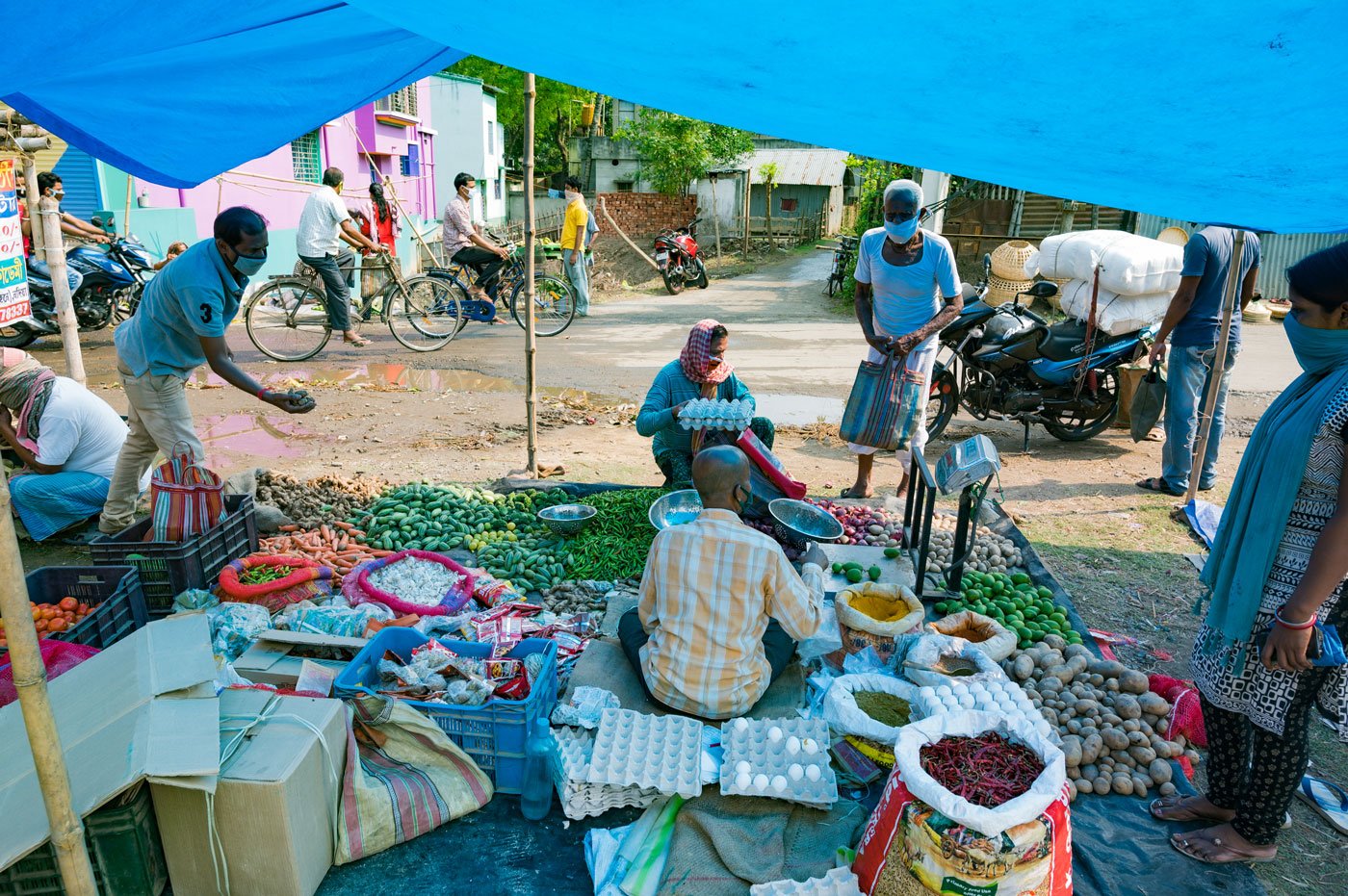
47 ವರ್ಷದ ಕಾರ್ತಿಕ್ ದೇಬನಾಥ್,ಮೊಟ್ಟೆ, ಶುಂಠಿ, ಈರುಳ್ಳಿ, ಮೆಣಸಿನಕಾಯಿ, ಬೆಳ್ಳುಳ್ಳಿ ಮತ್ತು ಇತರ ತರಕಾರಿಗಳನ್ನು ಮಾರುತ್ತಾರೆ.ಈ ಕೆಲಸವನ್ನು ಅವರು ಕಳೆದ ಮೂರು ದಶಕಗಳಿಂದ ಮಾಡುತ್ತಿದ್ದಾರೆ.”ನನ್ನ ವ್ಯಾಪಾರವು ಚೆನ್ನಾಗಿ ನಡೆಯುತ್ತಿದೆ, ಈಗ ಕೆಲವು ಹೊಸ ಗ್ರಾಹಕರು ಸಹ ಬರುತ್ತಿದ್ದಾರೆ" ಎಂದು ಹೇಳುತ್ತಾರೆ.
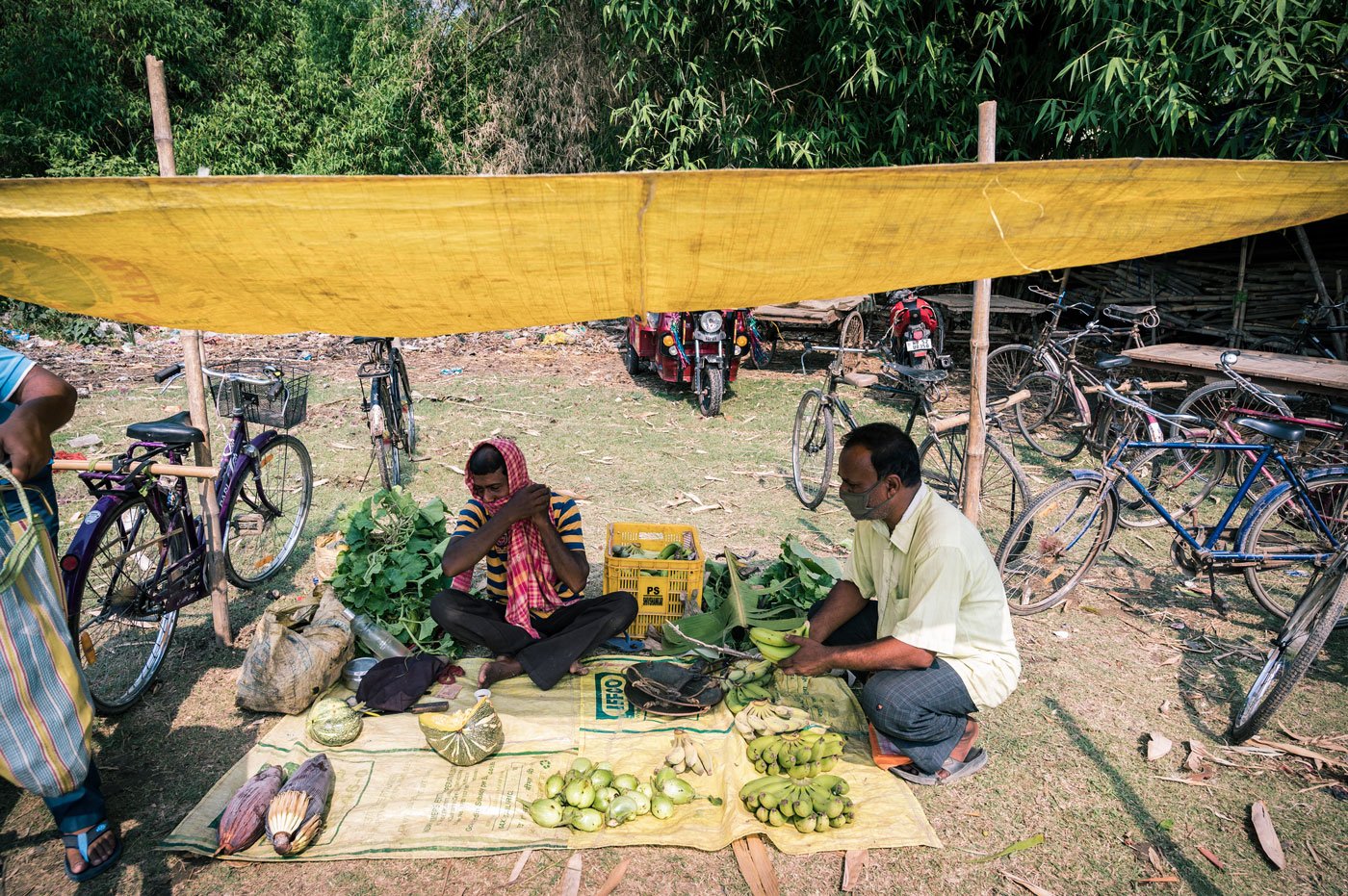
ಅನೇಕರು ಮುಖಕ್ಕೆ ಸುಧಾರಿತ ಮಾಸ್ಕ್ಗಳನ್ನು ಬಳಸುತ್ತಿದ್ದರೆ, 37 ವರ್ಷದ ರೈತ ಮತ್ತು ಅರೆಕಾಲಿಕ ತರಕಾರಿ ವ್ಯಾಪಾರಿಯಾಗಿರುವ ಬಾಬ್ಲು ಶೇಖ್ ಗಮ್ಛಾ (ವಸ್ತ್ರ)ವನ್ನು ಬಳಸುತ್ತಿದ್ದಾರೆ.
![Left: Khakon Pramanick, 45, who sells chickens and sometimes migrates to other states to work at construction sites, is now struggling with a drop from both sources of income. Right: Bharat Halder, 62, was a mason’s helper before he started selling fish around three years ago, hoping to earn more. During the lockdown, his earnings have dropped from around Rs. 250 a day to less that Rs. 200, he says. The supply of fish is also uncertain. “Fish is no longer coming from Andhra Pradesh due to the lockdown,” he says. “So the local pond and river fish [in smaller quantities] are now sold here.”](/media/images/09a-_DSC0045.max-1400x1120.jpg)
![Left: Khakon Pramanick, 45, who sells chickens and sometimes migrates to other states to work at construction sites, is now struggling with a drop from both sources of income. Right: Bharat Halder, 62, was a mason’s helper before he started selling fish around three years ago, hoping to earn more. During the lockdown, his earnings have dropped from around Rs. 250 a day to less that Rs. 200, he says. The supply of fish is also uncertain. “Fish is no longer coming from Andhra Pradesh due to the lockdown,” he says. “So the local pond and river fish [in smaller quantities] are now sold here.”](/media/images/09b-_DSC9999-2.max-1400x1120.jpg)
ಎಡಕ್ಕೆ: ಕೋಳಿಗಳನ್ನು ಮಾರುವ ಮತ್ತು ಕೆಲವೊಮ್ಮೆ ಕಟ್ಟಡದ ನಿರ್ಮಾಣ ಸ್ಥಳಗಳಲ್ಲಿ ಕೆಲಸ ಮಾಡಲು ಇತರ ರಾಜ್ಯಗಳಿಗೆ ವಲಸೆ ಹೋಗುವ 45 ವರ್ಷದ ಖಾಕೋನ್ ಪ್ರಮಣಿಕ್, ಈಗ ಎರಡೂ ಆದಾಯದ ಮೂಲಗಳು ಕುಂಠಿತಗೊಂಡಿರುವುದರಿಂದ, ಅವರಿಗೆ ಕಷ್ಟಕರವಾಗಿದೆ. ಬಲಕ್ಕೆ: 62 ವರ್ಷದ ಭರತ್ ಹಾಲ್ಡರ್ ಅವರು ಮೂರು ವರ್ಷಗಳ ಹಿಂದೆ ಕಲ್ಲಿನ ಕ್ವಾರಿಯಲ್ಲಿ ಸಹಾಯಕರಾಗಿ ಕೆಲಸವನ್ನು ಮಾಡುತ್ತಿದ್ದರು, ಹೆಚ್ಚಿನ ಆದಾಯವನ್ನು ಗಳಿಸುವ ನಿಟ್ಟಿನಲ್ಲಿ ಅವರು ಮೀನುಗಳ ಮಾರಾಟವನ್ನು ಪ್ರಾರಂಭಿಸಿದ್ದರು.ಲಾಕ್ ಡೌನ್ ದಲ್ಲಿನ, ಅವರ ಗಳಿಕೆಯು ಸುಮಾರು ದಿನಕ್ಕೆ 250 ರೂ.ದಿಂದ 200 ರೂ.ಗಳಿಗೂ ಕಡಿಮೆಯಾಗಿದೆ ಎಂದು ಅವರು ಹೇಳುತ್ತಾರೆ. ಮೀನುಗಳ ಪೂರೈಕೆ ಕೂಡ ಅನಿಶ್ಚಿತವಾಗಿದೆ. "ಲಾಕ್ ಡೌನ್ ನಿಂದಾಗಿ ಆಂಧ್ರಪ್ರದೇಶದಿಂದ ಮೀನುಗಳು ಇನ್ನು ಮುಂದೆ ಬರುವುದಿಲ್ಲ" ಎಂದು ಅವರು ಹೇಳುತ್ತಾರೆ.”ಆದ್ದರಿಂದ ಸ್ಥಳೀಯ ಕೊಳ ಮತ್ತು ನದಿಗಳಲ್ಲಿ ಹಿಡಿದ ಮೀನುಗಳನ್ನು ಈಗ ಇಲ್ಲಿ ಸಣ್ಣ ಪ್ರಮಾಣದಲ್ಲಿ ಮಾರಾಟ ಮಾಡಲಾಗುತ್ತದೆ."ಎನ್ನುತ್ತಾರೆ.
![Sridam Mondal, 62, mainly sells bananas and, at times, also a few vegetables. “The sales are very low [during the lockdown],” he says.](/media/images/10-_DSC9985.max-1400x1120.jpg)
62 ವರ್ಷದ ಶ್ರೀದಮ್ ಮೊಂಡಾಲ್,ಮುಖ್ಯವಾಗಿ ಬಾಳೆಹಣ್ಣುಗಳನ್ನು ಮತ್ತು ಕೆಲವೊಮ್ಮೆ ಕೆಲವು ತರಕಾರಿಗಳನ್ನು ಮಾರಾಟ ಮಾಡುತ್ತಾರೆ.”ಲಾಕ್ ಡೌನ್ ಸಮಯದಲ್ಲಿ ಮಾರಾಟವು ತುಂಬಾ ಕಡಿಮೆಯಾಗಿದೆ" ಎಂದು ಅವರು ಹೇಳುತ್ತಾರೆ.
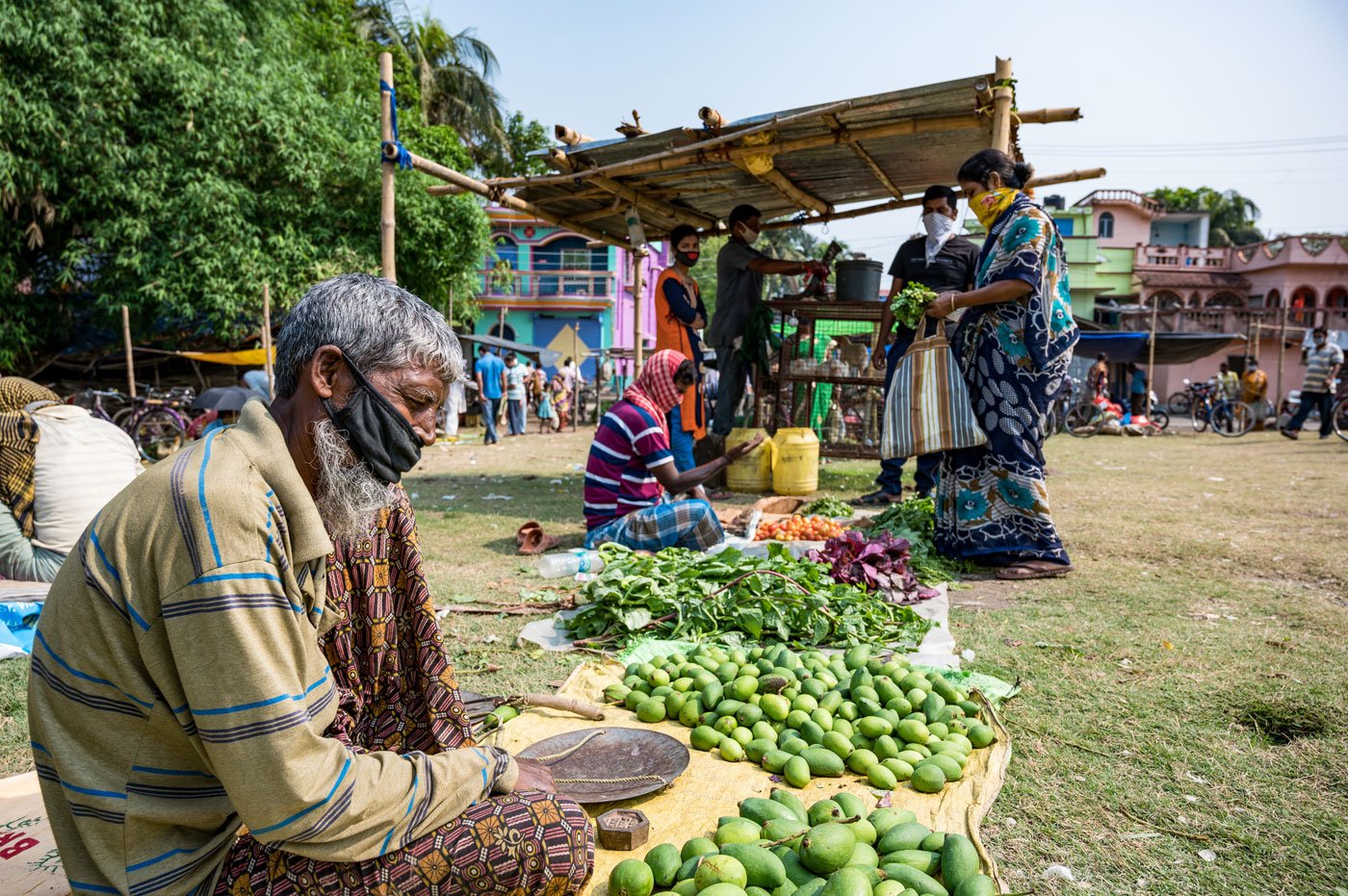
56 ವರ್ಷದ ಸಾಧು ಶೇಖ್, ಇತರ ವ್ಯಾಪಾರಿಗಳು ಕುಳಿತಿರುವ ಸ್ಥಳದಿಂದ ಸ್ವಲ್ಪ ದೂರದಲ್ಲಿ ತಮ್ಮ ನೆಲೆಯನ್ನು ಕಂಡುಕೊಂಡಿದ್ದಾರೆ.ಅವರು ತಮ್ಮ ಸ್ವಂತ ಸಣ್ಣ ಕೃಷಿಭೂಮಿಯಿಂದ ಮಾವಿನಹಣ್ಣು ಮತ್ತು ತರಕಾರಿಗಳನ್ನು ಮಾರುತ್ತಿದ್ದಾರೆ.
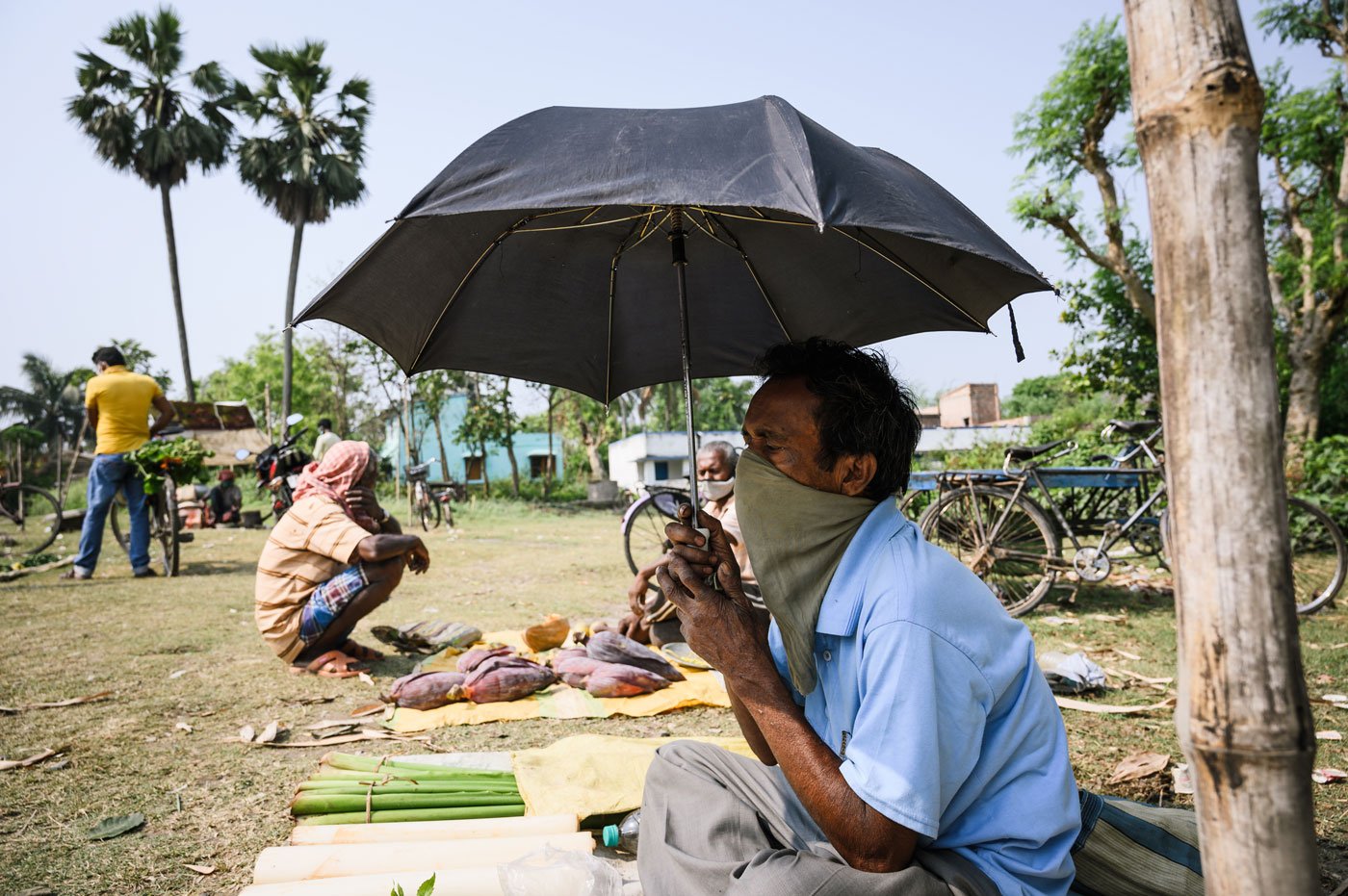
ಬಿಸಿಲಿನಲ್ಲಿ ಯಾವುದೇ ಪ್ಲಾಸ್ಟಿಕ್ ಶೀಟ್ ಇಲ್ಲದೆ 58 ವರ್ಷದ ಸದಾನಂದ್ ರಾಯ್ ಮೈದಾನದ ಮಧ್ಯ ಭಾಗದಲ್ಲಿ ಕೆಲವು ತರಕಾರಿಗಳೊಂದಿಗೆ ಕೊಡೆಯನ್ನು ಹಿಡಿದುಕೊಂಡು ಕುಳಿತುಕೊಳ್ಳುತ್ತಾರೆ. ದೆಹಲಿಯಲ್ಲಿ ಅವರು ಮನೆಗೆಲಸ ಮಾಡುತ್ತಿದ್ದರು, ಆದರೆ ಲಾಕ್ ಡೌನ್ ಗೂ ಮೊದಲು ತಮ್ಮ ಊರಿಗೆ ವಾಪಾಸ್ಸಾಗಿದ್ದರು. ಈಗ ಅವರಿಗಿರುವ ಏಕೈಕ ಆದಾಯವೆಂದರೆ, ಕೆಲವು ತರಕಾರಿಗಳನ್ನು ಮಾರಾಟ ಮಾಡುವುದಾಗಿದೆ. ಇದರಿಂದ ಅವರಿಗೆ ದಿನಕ್ಕೆ 50ರಿಂದ 100 ರೂಪಾಯಿಗಳ ಆದಾಯ ಬರುತ್ತದೆ. ”ನಾನು ನಿಯಮಿತವಾಗಿ ಇಲ್ಲಿಗೆ ಬರುವುದಿಲ್ಲ, ಏಕೆಂದರೆ ಕೆಲವು ದಿನ ನನ್ನ ಬಳಿ ಮಾರಾಟ ಮಾಡಲು ತರಕಾರಿ ಇರುವುದಿಲ್ಲ. ಮುಂದೆ ಏನಾಗುತ್ತದೆ ಎನ್ನುವುದು ನನಗೆ ಗೊತ್ತಾಗುತ್ತಿಲ್ಲ” ಎಂದು ಅವರು ತಮ್ಮ ಅಸಹಾಯಕತೆಯನ್ನು ವ್ಯಕ್ತಪಡಿಸುತ್ತಾರೆ.
ಅನುವಾದ - ಎನ್ . ಮಂಜುನಾಥ್
